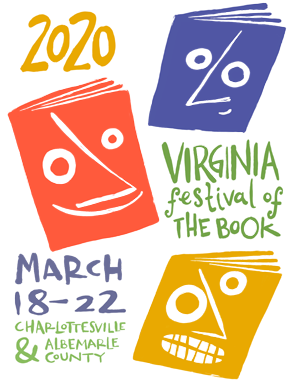
The Virginia Festival of the Book is an annual event that takes place in and around Charlottesville, VA. The 2020 edition was to have begun today, March 18, with dozens of programs over the next five days, but like so many other big events around the country, it has been canceled because of the risk of spreading the coronavirus. I was honored to have been asked to moderate a panel featuring three terrific authors, and before the unfortunate cancelation, I was preparing for the panel by reading their books and developing questions to ask when we gathered. Sadly, we cannot get together to discuss their work or to present it live to an audience, but I did invite all three authors to participate in a virtual panel, responding to my questions in writing, and the results are here.
First, though, I’d like to note that you can help support these authors by buying their books. It would be fitting, too, if you could purchase their books through New Dominion Bookshop, which was preparing to host our panel and had stocked these books. Otherwise, your nearest independent bookstore should be able to get the books for you.
Now, some introductions of the panelists.

Amitav Ghosh, author of Gun Island, is also the author of the bestselling Ibis trilogy, and the nonfiction book The Great Derangement. His other novels include The Circle of Reason, which won the Prix Médicis étranger, and The Glass Palace. He divides his time between India and New York.

Lindsay Lerman, author of I’m From Nowhere, holds a PhD in philosophy from the University of Guelph in Ontario, Canada. She lives in Richmond, where she works as a writer, academic translator, and teacher. Her first translation will be published in 2020. I’m From Nowhere is her first novel.
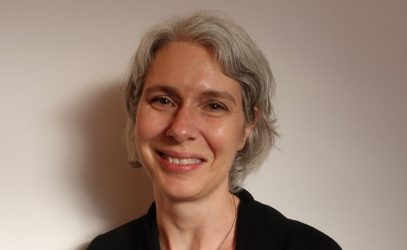
Johanna Stoberock, author of Pigs, lives in Walla Walla, Washington, and teaches at Whitman College.
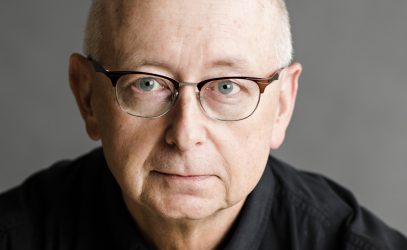
Clifford Garstang, author of The Shaman of Turtle Valley, won the Library of Virginia Literary Award for Fiction for his novel in stories, What The Zhang Boys Know, and is also the author of the story collection In an Uncharted Country.
Clifford Garstang: Let’s start with a question about the reason these three books were grouped together by the Virginia Festival of the Book on a panel called “Writing the Anthropocene.” Your books are set against a backdrop of human impact on the environment: extreme weather patterns in Gun Island, extreme global warming in I’m From Nowhere, and the ocean garbage crisis in Pigs. We can’t afford to ignore these problems, but what prompted you to incorporate them into your novels? On a related note, do you think writers have an obligation to address social issues?
- Amitav Ghosh: This panel introduced me to a lot of great books, for which I feel very grateful. I think all of us, as writers (including you of course, Cliff) are trying to address the realities of the world we live in. It’s impossible to shut our eyes to the disruptions of that world; we can just carry on writing as though nothing had changed. As for obligations, I think a writer’s principal obligation is to their work.
- Lindsay Lerman: In my case, I don’t think it was an entirely conscious decision to “include” the warming climate in the book. As the book developed and the desert setting became a character in its own right, I just wanted the book to reflect the reality that the desert’s heat becomes more intense and unbearable each year, and that it’s been this way for quite some time. Put differently, I simply couldn’t imagine telling a story set in the desert that didn’t acknowledge the reality of a changing, warming world. Especially because I’m From Nowhere is a book about death and mourning; how could a book about death and mourning not also engage the mourning we’re all surely doing as we make our world less inhabitable? I don’t know if writers have an obligation to address social issues, but if you write in order to understand the world and yourself, social issues and your relationship to them will show up in the work somehow.
- Johanna Stoberock: When I started writing Pigs, it didn’t occur to me that what I was writing was an “issues” novel. I just really loved the bizarro world of the island, and loved imagining all the things that the pigs on the island could eat (finally there was a place for all the junk my kids brought home from school!). But during the first summer I was working on the book, the news was filled with stories of children in overwhelmingly vulnerable situations, and somehow the container that I had created–an island that serves as the repository for everything the larger world throws away–began to stretch to contain those children, and then I realized that there was a connection between the children and the way that we treat the earth, and so the two kind of wound together.
- In terms of your second question, I really believe that writers only have an obligation to write well. But I do think that now is not a time to hold back if what you want to write about are social issues.
CG: Your books aren’t only about the impact of humans on the environment, however, as the environmental concerns feed back into impacts on people: the migration crisis, overheated personal relationships, and wasted human potential. These are obviously related concerns and I wonder if you could comment on this correlation.
- AG: I think it is obvious today, that it is impossible to separate our personal lives from everything that is happening around us. Thirty years ago it used to be said that writers from the Third World wrote about politics and social issues while Western writers wrote about the inner lives of their characters. It’s quite startling how quickly that has changed over the last few years.
- LL: This was especially important to me, as I wrote I’m From Nowhere and edited it. If I had wanted to write a book “about” climate crisis, I would have written nonfiction. With a novel, the goal is to capture the feeling–the texture–of a series of moments, and doing that requires attention to the feedback loop of life. If we’re writing about the world, we don’t get to pull human relationships out of the context(s) in which they occur. The unignorable context right now is ecological catastrophe that leaves traces everywhere. There’s no part of life on this planet that is untouched by it.
- JS: I don’t think we can separate out the effects of our changing environment from the way we think about our fellow human beings. It’s hard to imagine a life that is not affected by the way human beings treat the world, whether it’s about grasping to have more of an easy life or suffering immensely without access to that which would ease suffering, even a little bit.
CG: It seems to me that these topics are of utmost importance. Can you recommend other works of fiction that effectively address human impact on the environment?
- AG: I think Richard Powers’ Overstory is a great book. I also made some other recommendations here: https://www.theguardian.com/books/2019/oct/04/books-make-sense-wounded-planet-amitav-ghosh
- JS: I’m reading Deb Olin Unferth’s Barn 8 right now, about the chicken farming industry (and so much more), and am captivated by her ability to write both a very human novel and a novel that considers the environment, politics, and animal consciousness.
Questions for Amitav Ghosh:
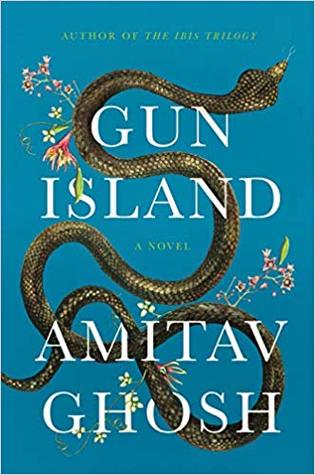
CG: I was already hooked when the narrator of Gun Island visits the shrine in the Sundarbans early in the novel and we learn about the legend of the Gun Merchant. I was then blown away when the connection to Venice is revealed (I hope that’s not too much of a spoiler), especially the references to Shakespeare’s Venetian plays. Can you comment on the genesis of the idea for the book?
- AG: The book grew out of my long personal relationship with Venice – I’ve been visiting the city for four decades and have watched its population change while its outward forms remain the same. The influx of people from Bengal was particularly striking to me and it played a large part in the genesis of the book.
CG: I was also intrigued by the character of Tipu and the emergence of his psychic abilities. His questions to the narrator about shamanism were of particular interest to me because of my own recent novel about a Korean shaman. How important to you are the mystical elements of the story, which help to tie the current plot to the Gun Merchant legend?
- AG: Like you I find shamanism very interesting especially because shamans were the people who gave voice to non-human beings – something that writers once did but now very rarely do.
CG: I was struck by the nobility of many of the characters in the novel. Young Rafi stands by his friend in need, Piya is a champion of the marine species she studies but also of the humans she feels responsible for, and an Italian admiral does the right thing in the face of official and popular opposition. There are many other examples, as well. Given the environmental catastrophe, how important was it to you to portray this heroism?
- AG: These characters are based on real-life examples. There was in fact an Italian admiral who said he would rescue people stranded at sea no matter what the government ordered – simply because it was the law of the sea. Similarly I have known many very dedicated conservationists.
Questions for Lindsay Lerman
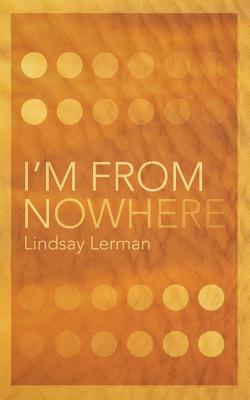
CG: Your novel is primarily a study of grief. Not only has your main character, Claire, lost her husband, but she’s grieving for the baby she didn’t conceive while he was alive. How is this exacerbated by the climate crisis going on in the background?
- LL: I think the climate crisis in the background heightens or exacerbates Claire’s grief, yes, but it also simultaneously shrinks it. She struggles with this throughout, asking herself if she has any right to grieve the death of one man when she is surrounded by death every day, when she knows that she’s luckier than most because she has a roof over her head and access to food, for instance. All I can really say is that I share this struggle and these questions with Claire–I am not comfortable with the fact that some deaths are considered more worthy of grief and grieving than others, and it is hard to know how much space we should give ourselves to grieve individual human lives as many species approach extinction everyday. Claire’s desire for a baby is another difficult aspect of the book, I think. The tensions that the baby represents cannot be easily resolved. On the one hand, Claire suspects she would never be content as a mother and housewife, she knows that having a baby during a never-ending crisis is not wise, and she wonders if she wants a baby for the “wrong” reasons (a desperate search for purpose and belonging, remaining comfortably within and doubling down on established gender roles, etc.). But on the other hand, she foolishly–but maybe also beautifully–suspects that she has more love to give, that there might be something glorious in the uselessness of human life and its continuation, and that she and John might have learned something crucial together as parents. John’s death prevents her from finding any of this out, and she feels some bitterness and anger about it–bitterness and anger that are selfish but not entirely so. The foreclosed possibilities in her life are not disconnected from the foreclosed possibilities in all our lives, as the climate and the issues related to it (famine, disease, war) shape each of us.
CG: In her grief, Claire turns to two male friends with whom she has a history. She is clearly struggling to fill her life, which now feels even emptier than it was, and her judgment may be clouded by her sense of loss. How do you think the climate situation has impacted her?
- LL: I think she finds herself feeling a kind of nihilistic “what’s it all for?” pull. She’s done everything she was supposed to, been just what the world wanted her to be, and she finds herself wondering if it has resulted in anything like liberation. Or, at a bare minimum, has it resulted in her being on the receiving end of respect or consideration? When she starts to see that the answer to these questions is no, all hell breaks loose for her. The climate heightens this (again). If everything is ending, why bother following the rules or doing what a “good girl” ought to? The fact that she turns to the men she turns to, however, is an indication (I think) that she’s fumbling in the dark a little bit as she aims for liberation. (Some readers don’t agree with me on this, though. I respect the fact that the book is not exclusively mine.) She has the right to fumble, like we all do.
CG: Claire and her husband had not agreed to have a baby, in part because he seems to have considered it irresponsible given the fragility of the environment. Claire, on the other hand, is desperately in search of fulfillment that she thinks a child will bring. Can you comment on this conflict between them—John who is pessimistic about the future and Claire who feels a need to move on?
- LL: At the beginning of the book, I think the conflict is framed in terms of something like pessimism and optimism, but by the end of the book, Claire understands that it’s a more complicated issue, having to do with who is taken to be capable of shaping shared lives–who gets to make decisions, who gets to think about and orient lives toward a future, who is granted agency in this sense. Claire wonders, by the end, if John’s pessimism and concerns about having a baby are less about pessimism, per se, and are more about controlling the shape and direction of Claire’s life. Now that I think about it, it seems important to keep these concerns up front, to ask ourselves to remember that issues of gender politics, for instance, will not be magically resolved at the end of the world. Even as crises continue to upset normalcy, we will have to grant ourselves permission to ask who is making decisions for us and why, and who they benefit. With Claire and John, we see this playing out on a micro scale–the scale of individual lives.
Questions for Johanna Stoberock
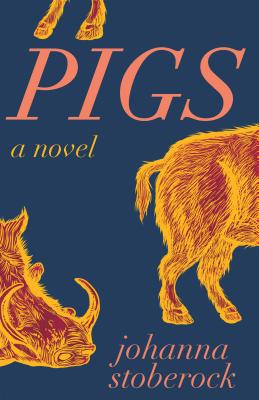
CG: I loved (and was horrified by) the descriptions of all the trash that washes up on the beaches of your island which the little tribe of children then feed to the pigs. While it’s easy to see the point about our wasteful society, it’s maybe a little less clear what’s being said about the children. Partly, I suppose, it’s that we’re leaving our mess for our children to clean up, but maybe there’s something more there, too? What are we doing to our future?
- JS: I mentioned above that, early in the writing process, it seemed like I couldn’t turn on the radio without hearing another story about the world’s mistreatment of its children. This, of course, has been the story since long before I started writing, and has continued to be the story during the long process of finishing and then publishing the novel, and will continue long past its publication. One of the things I tried really hard to do was write love into the book–it’s dark, for sure, but I loved every piece of garbage that washed onto the island’s shore (partly because it was fun writing them, and partly because I think that, if we’re throwing something away, our job is to look at it first and try to love it). With the novel’s children, I wanted them just to be ordinary kids who have to deal with the mess of the world with the ordinary tools that they have. No one is going to save them but themselves–they know it, even if the only compassionate adult on the island (Otis) thinks he can make everything better for them.
CG: Jonathan Lethem calls your book a “dark-inflected allegory,” which I’d certainly agree with, and he also mentions its connection to Lord of the Flies. He might also have mentioned Animal Farm, given the importance of the pigs to the story as well as the oppression of the children by the adults on the hill. Can you comment on your inspiration or influences for the book?
- JS: You know, it’s funny, but I
hadn’t read Lord of the Flies since high school when I started
writing Pigs. Half way through, I realized how much I owed to
that novel, and I reread it then (P. 108 tries to find a way to say thank you
to that book, and I’ve tried to include thank you’s throughout to other works
that wormed their way into my head and came out in the novel–the television
show, Lost, Peter Pan, etc.). But the more explicit influences
are these:
- The short Brazilian film, Isle of Flowers, by Jorge Furtado (1989), which I saw as part of the Seattle Human Rights Film Festival in the mid-1990’s. It tracks the life of a single tomato plant. An indelible image from the film is that of pigs getting access to a garbage dump to look for food before children are allowed access.
- The TV show Criminal Minds, which aired an episode shortly before I began writing Pigs in which a serial killer feeds his victims to his pigs.
- My backyard chickens, who eat everything.
CG: Possibly my favorite character in the novel is Otis, the adult who drifts ashore and joins forces with the children. He seems to undergo the greatest change of all the characters. Since we don’t want to spoil the ending, could you talk a little about his past? He behaved pretty badly as a husband and father, so is that why he lands on this island? And is he there to atone?
- JS: I’m glad you liked Otis–he’s my favorite character, too! It’s funny, I have whole drafts of the novel that show his past, but, ultimately, the thing that seemed right for the book is that characters are only in focus on the island. So I’ll just say this–he is where he is because he’s just one of those people who can’t help but throw away the things that matter to him most. And he finds a way to move forward (maybe atone) because going backwards is simply not a possibility: his marriage is over; he can’t get back to his son; he can’t love the world through his eyes–what’s done is done, and we all just have to move on instead of looking to the past. And he does act well in the end, and he does find a new way to create meaning in the world.

Comments